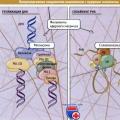The trip to Olepin gave me an unforgettable experience. Collection of ideal social studies essays
All people are different, each has their own character, and therefore their attitude towards the world around them is different. In this text V.A. Soloukhin raises the problem of the relationship between man and nature.
The narrator recalls his trip to Olepin, introducing the reader to beautiful, magical places, describing every detail of the landscape. For him, this is a “wonderful scarlet country”, which, unfortunately, is impossible to get into again.
The problem under discussion is so important that many writers have raised it in their works. Let us remember the novel by I.S. Turgenev "Fathers and Sons". Nihilist Evgeny Bazarov is far from such concepts as the beauty of the world around him, enjoying the rays of the sun, the breath of the wind, which are characteristic of Arkady.
The hero turns to nature only as his subject scientific activity, which is absolutely wrong, and Bazarov understands this later.
In the novel L.N. Tolstoy’s “War and Peace” also shows this problem. Andrei Bolkonsky is one of the few who are able to truly appreciate the bright details of the world around them. The oak turned out to be a symbol of his psychological state, an image of the changes taking place in the hero’s life.
Thus, nature has a huge impact on us, our mood depends on it, it adds up our memories, which have great importance, teaches you to appreciate the unique moments of life.
Russian language
21 of 24
(1) The trip to Olepin gave me an unforgettable experience. (2) Morning found me not in bed, not in a hut or city apartment, but under a haystack on the banks of the Koloksha River.
(3) But it’s not fishing that I remember the morning of this day. (4) Not for the first time I approached the water when it was dark, when you couldn’t even see the floats on the water, barely beginning to absorb the very first, lightest lightening of the sky.
(5) Everything was as if ordinary that morning: catching perches, the flock of which I attacked, and the pre-dawn chill rising from the river, and all the unique smells that arise in the morning where there is water, sedge, nettle, mint, meadow flowers and bitter willow.
(6) And yet the morning was extraordinary. (7) Scarlet clouds, round, as if inflated, floated across the sky with the solemnity and slowness of swans. (8) The clouds also floated along the river, coloring not only the water, not only the light steam above the water, but also the wide glossy leaves of water lilies. (9) The white fresh flowers of the water lilies were like roses in the light of the burning morning. (Yu) Drops of red dew fell from a bent willow into the water, spreading red circles with a black shadow.
(11) An old fisherman walked through the meadows, and in his hand a large caught fish blazed with red fire. (12) Haystacks, haystacks, a tree growing at a distance! the copse, the old man's hut - everything was seen especially prominently, brightly, as if something had happened to our vision, and it was not the play of the great sun that was the reason for the extraordinary nature of the morning. (13) The flame of the fire, so bright at night, was almost invisible now, and its pallor further emphasized the dazzlingness of the morning sparkle. (14) This is how I will forever remember those places along the bank of Koloksha where our morning dawn passed.
(15) When, having eaten fish soup and fallen asleep again, caressed by the rising sun! and having slept well, we woke up three or four hours later, it was impossible to recognize the surroundings. (16) The sun, rising to its zenith, removed all shadows from the earth. (17) Disappeared: the contour, the convexity of earthly objects, the fresh coolness and the burning of dew, and its sparkle disappeared somewhere. (18) The meadow flowers faded, the water became dull, and in the sky, instead of bright and lush clouds, a smooth whitish haze spread like a veil. (19) It seemed that a few hours ago we had magically visited a completely different, wonderful country, where there are scarlet lilies and red lilies! a fish on a rope with an old man, and the grass shimmers with lights, and everything there is clearer, more beautiful, clearer, just as it happens in wonderful countries, where one ends up] solely by the power of fairy-tale magic.
(20) How can I get back to this wondrous scarlet country? (21) After all, no matter how much you come later to the place where the Chernaya River meets the Koloksha River and where the town’s roosters crow behind the epic hill, you won’t get where you want, as if you forgot the all-powerful magic word that moves forests and mountains apart. (22) No matter how much I later went fishing from Moscow to Koloksha, I could not get to that country and I realized that every morning, every spring, every love, every joy is unique in life for a person.
(23) It was then that I remembered the most wondrous of all magical countries - the country of my childhood. (24) The keys to it are thrown so far away, lost so irretrievably, that you will never, never see even one trifling path for the rest of your life. (25) However, in that country there cannot be a trifling path. (24) Everything there is full of significance and meaning. (27) A person who has forgotten what was there and how it was there, a person who has even forgotten that it once was, is the poorest person on earth.
(According to V.A. Soloukhin)
*Vladimir Alekseevich Soloukhin is a Russian Soviet writer and poet, a prominent representative of “village prose.”
Show full text
What effect does nature have on humans? This problem is raised by Vladimir Alekseevich Soloukhin in the proposed text.
The author examines the problem using the example of a morning spent on the banks of the Koloksha River. That morning the writer noticed the beauty of nature, as if he had found himself in a wonderful country: “...we magically visited a completely different, wonderful country...”. Soloukhin argues that he won’t be able to get into this wonderful country again: “After all, no matter how much you come to the place... you won’t get where you want...”.
The poet believes that nature helps a person appreciate all the moments of life, because they are unique. It helps you notice small details of the world around you and gives you a feeling of happiness from its contemplation.
I agree with the author’s opinion, nature helps you appreciate any moments in life, and also greatly influences your mood. If you are upset because of some problems, then a walk in the park can easily lift your spirits, help you rethink everything and understand that all problems are temporary. After such a walk, you already return in high spirits, ready to do new things.
When reading this text, I remember the epic novel “War and Peace”, when Natasha Ro
Criteria
- 1 of 1 K1 Problem formulation source text
- 2 of 3 K2
(1) The trip to Olepin gave me an unforgettable experience. (2) Morning found me not in bed, not in a hut or city apartment, but under a haystack on the banks of the Koloksha River. (3) But it’s not fishing that I remember the morning of this day. (4) Not for the first time I approached the water when it was dark, when you couldn’t even see the floats on the water, barely beginning to absorb the very first, lightest lightening of the sky. (5) Everything was as if ordinary that morning: catching perches, the flock of which I attacked, and the pre-dawn chill rising from the river, and all the unique smells that arise in the morning where there is water, sedge, nettle, mint, meadow flowers and bitter willow. (6) And yet the morning was extraordinary. (7) Scarlet clouds, round, as if inflated, floated across the sky with the solemnity and slowness of swans. (8) The clouds also floated along the river, coloring not only the water, not only the light steam above the water, but also the wide glossy leaves of water lilies. (9) The white fresh flowers of the water lilies were like roses in the light of the burning morning. (Yu) Drops of red dew fell from a bent willow into the water, spreading red circles with a black shadow. (11) An old fisherman walked through the meadows, and in his hand a large caught fish blazed with red fire. (12) Haystacks, haystacks, a tree growing at a distance! the copse, the old man's hut - everything was seen especially prominently, brightly, as if something had happened to our vision, and it was not the play of the great sun that was the reason for the extraordinary nature of the morning. (13) The flame of the fire, so bright at night, was almost invisible now, and its pallor further emphasized the dazzlingness of the morning sparkle. (14) This is how I will forever remember those places along the bank of Koloksha where our morning dawn passed. (15) When, having eaten fish soup and fallen asleep again, caressed by the rising sun! and having slept well, we woke up three or four hours later, it was impossible to recognize the surroundings. (16) The sun, rising to its zenith, removed all shadows from the earth. (17) Disappeared: the contour, the convexity of earthly objects, the fresh coolness and the burning of dew, and its sparkle disappeared somewhere. (18) The meadow flowers faded, the water became dull, and in the sky, instead of bright and lush clouds, a smooth whitish haze spread like a veil. (19) It seemed that a few hours ago we had magically visited a completely different, wonderful country, where there are scarlet lilies and red lilies! a fish on a rope with an old man, and the grass shimmers with lights, and everything there is clearer, more beautiful, clearer, just as it happens in wonderful countries, where one ends up] solely by the power of fairy-tale magic. (20) How can I get back to this wondrous scarlet country? (21) After all, no matter how much later you come to the place where the Chernaya River meets the Koloksha River and where
Composition:
How should a person relate to nature? Should we keep in mind the memories of our native places? V.A. devotes his text to the answers to these questions. Soloukhin.
In the text proposed for analysis, the author raises a number of important issues. Special attention He focuses on the problem of man's relationship to nature.
The writer reveals the problem by describing the hero’s feelings that he experienced, remembering his train to Olepin, which gave him an unforgettable experience. “Scarlet clouds”, “white fresh flowers”, “drops of red dew” - all this was so deeply imprinted in his head that for a long time the narrator recalled his time alone with the “wonderful country”.
In addition, the hero expresses his opinion that a person who was in nature and then threw this segment of life out of his head is “the poorest person on earth.”
The author’s position on this issue is expressed quite clearly: he strives to convey to the reader the idea that it is important not only to devote one’s time to nature, but also to keep in mind every such moment. However, not every person is able to treat the world around them with such reverence.
It is difficult to disagree with the author’s position, because the world around us is capable of giving us vivid memorable moments for the rest of our lives, but nevertheless, there are people who are able to forget the natural places they visit.
The work of I.S. can serve as an argument. Turgenev “Fathers and Sons”. Evgeny Bazarov, a supporter of nihilism, believes that nature is not a temple, but a workshop, and man is a worker in it. It is incomprehensible to him that moral satisfaction from environment, so characteristic of Arkady. Main character turns to nature only during scientific experiments. But even such a person, so devoted to his ideology, still realizes in the end how wrong he was.
Another example that proves my point of view is the epic novel by L.N. Tolstoy “War and Peace”. Natasha, filled with love for her native nature, admires the extraordinary beauty of the starry sky during the scene in Otradnoye. It fascinates her so much that she is unable to restrain her emotions. The heroine perks up and is filled with happiness at the sight of heavenly beauty, and they even call Sonya to the window so that she too can enjoy this beautiful night.
Thus, both I.S. Turgenev, and L.N. Tolstoy just like V.A. Soloukhin in his works discusses the relationship of man to nature.
To summarize, I would like to say that people’s opinions regarding their attitude towards nature may differ.
Each of us, somewhere in a corner of our memory, has preserved imprints of a joyful worldview, from which bright memories were once formed and continue to be formed.
In this text V.A. Soloukhin raises the problem of perception of the surrounding world.
The narrator immerses us in the world of his own memories, in a “wonderful country”, in which every detail has its own extraterrestrial, extraordinary radiance, and, what is very important, a unique meaning. The author describes his trip to Olepin, namely the “wonderful scarlet country” from his own memories, and through the prism of his worldview introduces the reader to the beauty of this place, describing every detail of the landscape, shrouded in a veil of “dazzling morning sparkle.” The narrator draws our attention to the fact that the place “where the Chernaya River meets the Koloksha River” is one of his most vivid memories and compares it to a wonderful country, “where you get only by the power of fairy-tale magic.”
The author believes that every moment of our life is unique, and everything that surrounds us is filled with significance and meaning - especially reminiscences from childhood. Therefore, it is very important to appreciate every moment of these memories, because a person who has lost even the brightest and brightest moments from his own memory is “the poorest person on earth.”
I completely agree with the opinion of Vladimir Alekseevich and also believe that everything in a person’s life is unique - feelings, emotions, and the onset of a new day. To perceive the world as something bright, rich, and beautiful means to keep in your memory and in your soul the warmth of bygone moments, which can warm a person even in the coldest period of life.
Yuri Nagibin also turns us to the problem of perception of the surrounding world in the story “Winter Oak”. The main character, Savushkin, knew how to feel the beauty of the world around him, namely the winter forest, perceived the elements of nature as something living, capable of feeling and stored all this in his memory. The boy’s teacher, unfortunately, was no longer capable of such a perception of the world around her, however, having found herself in this marvelous, fabulous winter forest, which was so dear to Savushkin, she understood why the student believes that the Winter Oak is an animate object, like and the entire forest surrounding it. It’s just that the little boy was still able to see and feel the magic in every detail.” fairyland”, which surrounded him, and even managed to awaken something similar in his teacher.
In the epic novel L.N. Tolstoy's "War and Peace" the author shows that even after living for many years, a person is still able to take a fresh look at the world around him. Andrei Bolkonsky is one of the few who was able to store vivid and significant details of the world around him in his memories, and some of them were able to completely change the hero’s worldview. Thus, the oak tree remained a vivid imprint in the commander’s memory - a symbol of the psychological state of the commander himself, which turned the consciousness of the protagonist upside down, forced him to perceive in a new way the world and life in general and remained a bright and bright spot in the memory of Andrei Bolkonsky.
Thus, we can conclude that everything in a person’s life is unique, every memory plays its own role, and every detail in the nature around us has its own meaning.
 Abstract of the subject of organic chemistry
Abstract of the subject of organic chemistry Cell nucleus: functions and structure
Cell nucleus: functions and structure Prince Igor and Princess Olga
Prince Igor and Princess Olga